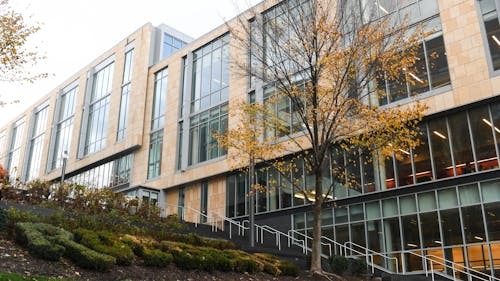EDITORIAL: Academic work must not be undue burden on relaxation during Thanksgiving break
During Thanksgiving, students must have time to decompress and not worry about school work

Last week, students were able to enjoy a break from the pressures and expectations of daily life at college. For a few days, many Rutgers students got to go home, enjoy some time with their families and fully disconnect from the requirements of being students. No lectures to attend, no readings to get through, no coursework — just a few days of disconnected bliss. But was it?
By the middle of November, college students everywhere are likely ready to be done with their semesters. Since September, students at Rutgers have been going full steam with their coursework — with little time to catch their breath. Then, Thanksgiving comes, and we suddenly have a few days to recharge our batteries to make it to the end of the semester.
The break, though, usually ends up being more stressful than relaxing, with students trying to complete assignments and prepare for finals.
At the outset, it is important to note that Thanksgiving does fall near the end of the semester and that work is expected to get busy shortly after students return from their break. At Rutgers, for example, Thanksgiving falls three weeks before the end of the semester which increases the pressure to use the break to study or prepare for final projects.
While this is, to some degree, understandable, there are some other issues that have arisen that are problematic. Rutgers has a mandate against having work due during breaks, so in theory, students get a few days away from their studies and deadlines to enjoy their time. During Thanksgiving break, Rutgers students should especially not have anything due from Thursday through Sunday.
But regardless of this academic mandate, some students have expressed that they in fact had work due during their break — whether it be homework, papers or other assignments. Students should not be forced to submit work during the break as it encroaches on students' time to recharge. There are also distractions and family engagements, for example, during breaks that make it difficult for students to give assignments their full attention.
It is important that Rutgers faculty know about these mandates and that they respect such policies. Prior to breaks, departments should alert faculty to the policies and remind them that work should not be due during the break. Such a clear set of expectations would lead faculty to stay away from setting deadlines during breaks.
Another challenge students have faced is having work due immediately after their break ends. There should be a grace period to allow students time to get back on campus and work on assignments. If something is due at 9 a.m. the Monday after Thanksgiving, for instance, students would have had to work on the assignment and be stressed about it during the break, thereby defeating the purpose of the few days off.
Major assignments, such as capstone projects or long papers, should not be due right after the break. It is important to give students time to adjust back to their schedules.
As stated above, we expect to have work after Thanksgiving break — it is inevitable due to where the holiday falls and how close to the end of the semester we are. But students returning from the holiday should not see a deluge of work that is so overwhelming it diminishes the little recharging they have been able to do.
Another tangential issue is that of grades. Students might be more stressed and more prone to do work over break if they do not know where they stand in the class. By Thanksgiving break, grades should be generally updated so that students know where they stand and what they have to do.
Ultimately, these issues come down to communication — communication between the University and its departments, between the departments and their faculty and between faculty and students. If faculty know about these guidelines, they will likely not impose deadlines on students during breaks.
Likewise, if professors are setting those deadlines, students should approach their professors and let them know about any challenges they might have in getting work done. Everyone is human, and some things fall through and are overlooked. Ultimately, students should be proactive in advocating for themselves and their needs.
The Daily Targum's editorials represent the views of the majority of the 154th editorial board. Columns, cartoons and letters do not necessarily reflect the views of the Targum Publishing Company or its staff.



